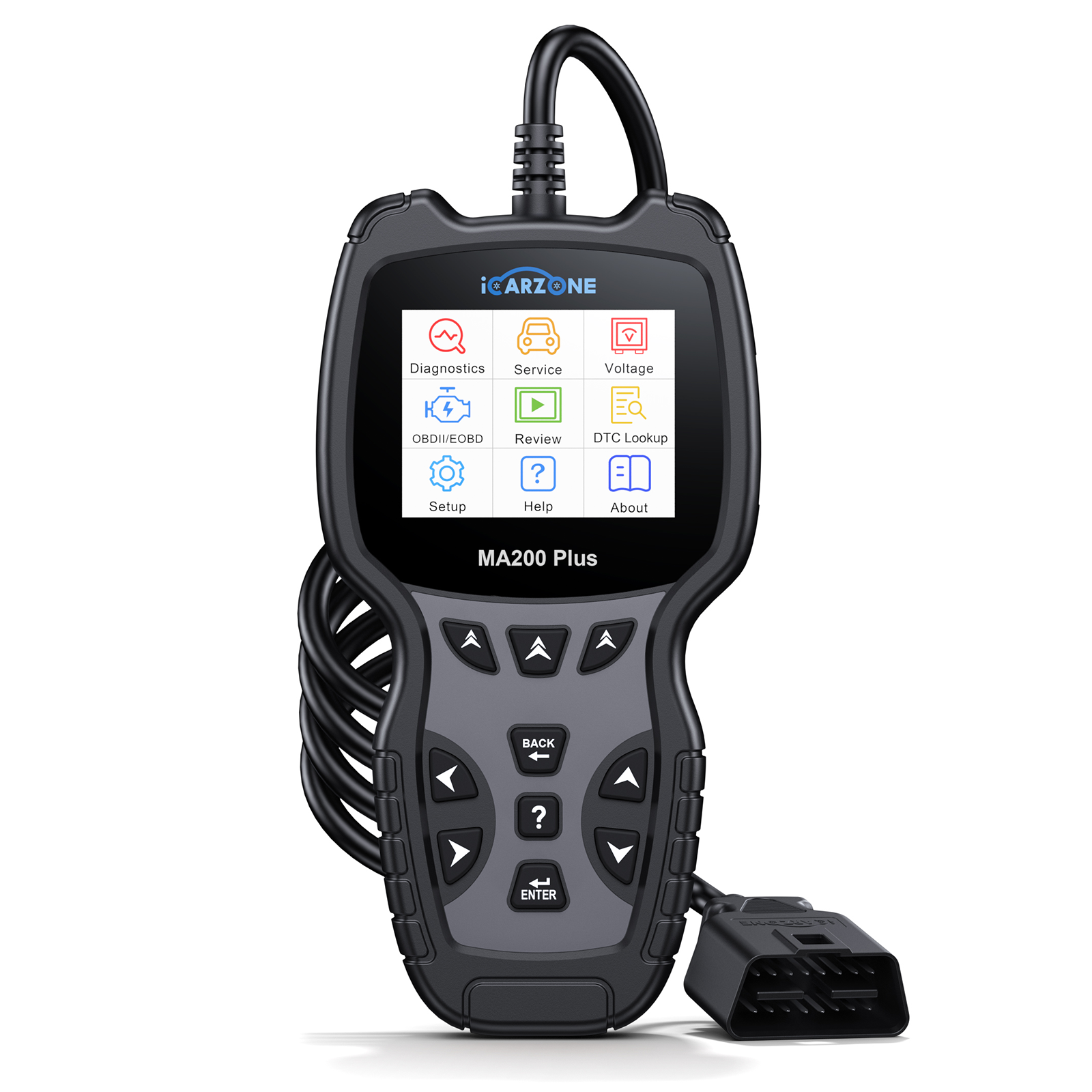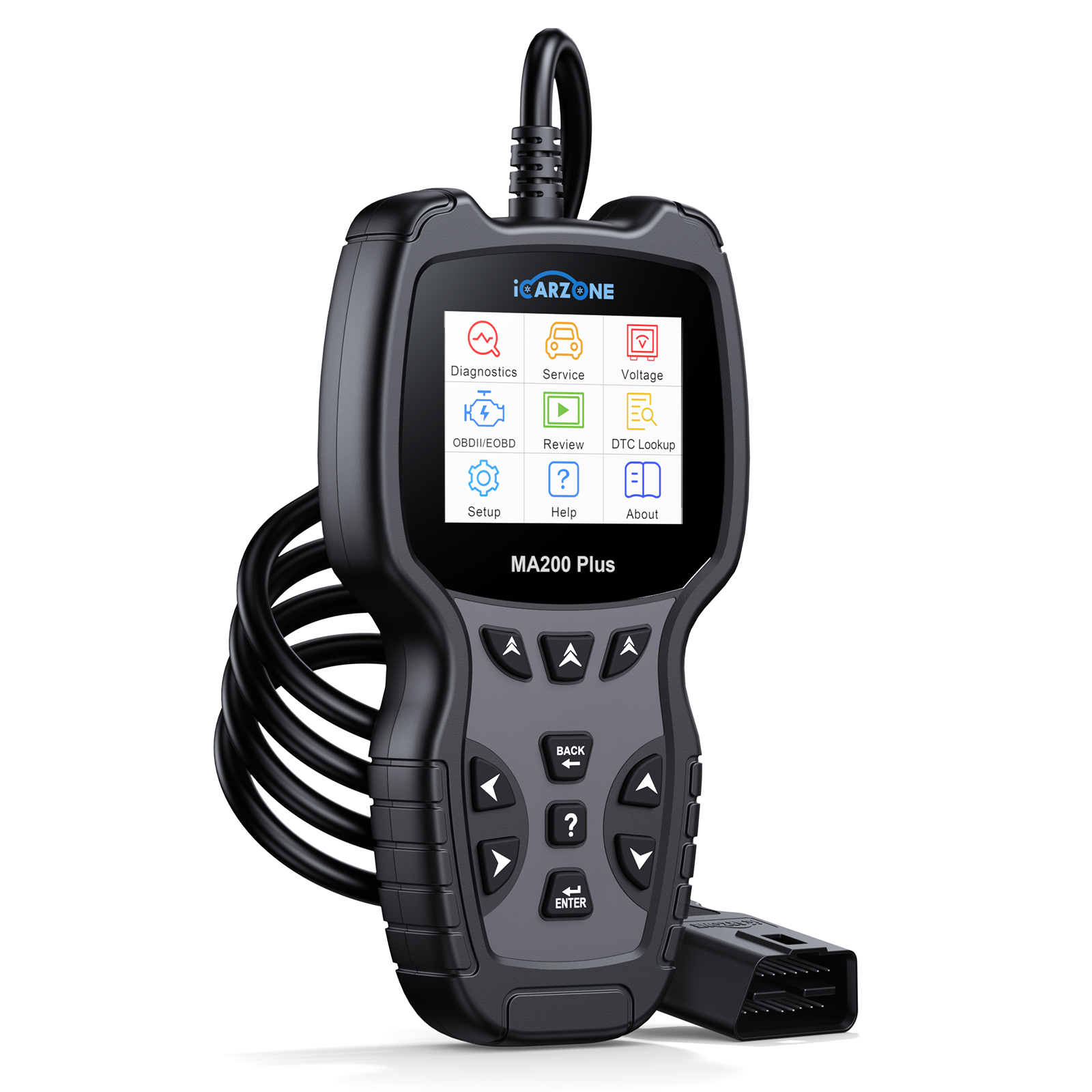P1296: Cylinder Head Temperature Sensor A Circuit High Input– ICARZONE UR1000 for VW Golf GTI

P1296: Cylinder Head Temperature Sensor A Circuit High Input
Solve P1296 in Volkswagen Golf GTI. Learn causes, symptoms, and fixes for this overheating-related code using the iCarzone UR1000 diagnostic tool.
Get UR1000 Diagnostic Tool1. What is P1296?
P1296 is a manufacturer-specific Diagnostic Trouble Code for Volkswagen, indicating a Cylinder Head Temperature (CHT) Sensor A Circuit High Input. The CHT sensor monitors cylinder head temperature (critical for turbocharged engines like the Golf GTI’s 2.0T), and P1296 triggers when the ECM detects a voltage signal above the normal range (>4.8V).
Why It Matters for Volkswagen Golf GTI
In Volkswagen Golf GTI models (MK7/MK8), the 2.0T TSI engine operates at high cylinder head temperatures (up to 250°C under load). The CHT sensor prevents overheating by signaling the ECM to activate cooling systems—P1296 disrupts this, risking engine damage or limp mode activation.

2. Common Causes in Volkswagen Golf GTI
P1296 is a top-reported code in 2015-2023 Volkswagen Golf GTI models. Here are verified causes with real-world examples:
- Failed CHT Sensor — Example: 2019 Golf GTI MK7 owner reported P1296 and overheating. UR-1000 testing showed constant 5V signal (normal: 0.5V-4.5V); replacing the sensor (VW part #06K 919 501 A) fixed the issue.
- Wiring Damage from Heat — Example: 2017 Golf GTI with 70,000 miles developed P1296. CHT sensor wiring near the turbocharger was melted (a known MK7 issue); repairing with heat-resistant wire resolved the code.
- Coolant Leaks — Example: 2021 Golf GTI MK8 displayed P1296 after coolant loss. A cracked cylinder head gasket (common in high-mileage 2.0T engines) exposed the CHT sensor to air, causing high input.
- Corroded Connector — Example: Coastal Golf GTI owner had intermittent P1296. The CHT sensor’s 2-pin connector (VW part #1J0 973 703) had salt corrosion; cleaning and applying dielectric grease fixed it.
- ECM Software Glitch — Example: 2022 Golf GTI showed P1296 after a dealer service. UR-1000 detected outdated ECM firmware; updating to VW’s v0321 calibration eliminated the false code.

3. Key Symptoms in Volkswagen Golf GTI
Volkswagen Golf GTI owners typically notice these P1296 symptoms, often worsening during spirited driving or hot weather:
- Check Engine Light illuminated with "Engine Overheating Risk" message (VW-specific warning)
- Temperature gauge pegging at "H" (hot) or fluctuating erratically
- Reduced power or limp mode activation (GTI’s ECM limits performance to prevent damage)
- Turbocharger lag or delayed boost response (common in MK7/MK8 models)
- Unusual engine noise (tickling or knocking) from overheated components
- Difficult starting when engine is hot (above 90°C)
- Cooling fan running continuously, even at idle
4. VW Golf GTI Models Prone to P1296
While P1296 affects VW’s 2.0T engines, these Golf GTI variants have the highest incidence:
- 2015-2020 Volkswagen Golf GTI MK7 (2.0T TSI EA888 Gen 3)
- 2021-2023 Volkswagen Golf GTI MK8 (2.0T TSI EA888 Gen 4)
- 2018-2020 Volkswagen Golf GTI TCR (high-performance trim with increased heat load)
- 2016-2019 Volkswagen Golf R (shares 2.0T engine with GTI, similar P1296 triggers)
Volkswagen issued TSB 20-01-04 addressing P1296 in 2015-2018 Golf GTI MK7 models with CHT sensor software updates.
5. Diagnostic Steps (VW Golf GTI Focus)
Diagnose P1296 in Volkswagen Golf GTI using the iCarzone UR-1000 with this model-specific procedure:
| Step | Action | Tools Needed | Goal |
|---|---|---|---|
| 1 | Scan CHT Sensor Data | iCarzone UR-1000 | Confirm P1296 and check CHT voltage (should read 0.5V-4.5V; P1296 shows >4.8V) |
| 2 | Locate CHT Sensor | Flashlight, socket set | Find sensor on driver-side cylinder head (Golf GTI) and inspect for damage |
| 3 | Test Wiring & Connector | UR-1000, multimeter | Verify 5V reference, ground, and signal wires; check for open circuits |
| 4 | Check Coolant Level | Coolant tester, funnel | Ensure proper coolant level (G13 pink coolant for VW) and no leaks |
| 5 | Check VW TSBs | UR-1000 VIN Lookup | Identify Golf GTI-specific bulletins (like TSB 20-01-04) |
Example: A 2019 Golf GTI MK7 with P1296 showed 5V CHT signal via UR-1000. Further testing found a broken wire in the sensor harness — repairing and securing it away from the turbo resolved the code.
Diagnose Golf GTI with UR10006. Fixes & Execution
- Replace CHT Sensor: Use OEM VW part #06K 919 501 A (MK7) or #06K 919 501 B (MK8) for compatibility with Golf GTI’s 2.0T engine.
- Repair Wiring Harness: Replace damaged sections with VW-spec heat-resistant wire (TL 1010) and install heat shields near the turbocharger.
- Fix Coolant Leaks: Repair cracked gaskets (use VW’s updated cylinder head gasket #06K 103 383 AM) or hoses; refill with G13 coolant.
- Clean/Replace Connector: Use electrical contact cleaner on the 2-pin connector; replace if pins are corroded (VW part #1J0 973 703).
- ECM Software Update: Use UR-1000 to install VW’s latest calibration (critical for 2015-2018 MK7 models with TSB 20-01-04).
VW Golf GTI Specific Workflow
- Always test CHT sensor voltage with UR-1000 first — 40% of Golf GTI P1296 cases are wiring/coolant issues, not sensor failures.
- For MK7 Golf GTI, inspect the CHT sensor’s proximity to the turbo heat shield — reposition if wiring is touching hot components.
- After repairs, clear codes with UR-1000 and perform a 20-minute test drive (including highway speeds) to verify cooling system function.
7. Repair Costs & Safety Tips
- OEM CHT Sensor: $50–$90 (VW part #06K 919 501 A/B)
- Wiring Repair Kit: $25–$50 (heat-resistant wire + shields)
- Coolant & Leak Repair: $40–$180 (G13 coolant + gaskets)
- ECM Software Update: $0–$40 (DIY with UR-1000 vs. $100–$150 at VW dealer)
- Professional Repair: $180–$350 (parts + labor for sensor/wiring)
Safety Precautions
- Allow Golf GTI engine to cool completely (2+ hours) before working on CHT sensor — cylinder head temperatures can exceed 250°C.
- Relieve coolant system pressure by opening the pressure relief valve (on expansion tank) before disconnecting hoses.
- Disconnect the battery when repairing wiring to avoid short circuits in the ECM.
- Use a torque wrench to reinstall the CHT sensor (15 ft-lbs for VW 2.0T engines) to prevent thread damage.
8. Preventive Maintenance
Volkswagen Golf GTI owners can prevent P1296 with these turbo engine-focused steps:
- Inspect CHT sensor wiring and connector every 30,000 miles, especially if you drive aggressively.
- Use only VW-recommended G13 pink coolant — other coolants can corrode the CHT sensor.
- Use UR-1000 to monitor CHT data monthly — abnormal voltage spikes (>4.5V) can predict P1296.
- Replace the coolant expansion tank cap every 2 years (VW part #1K0 121 403 A) to maintain proper system pressure.
- For track-day GTI owners, install an aftermarket CHT sensor heat shield to protect wiring from turbo heat.
9. Frequently Asked Questions
No — P1296 signals overheating risk. Driving even short distances can cause cylinder head warping or turbo damage in GTI’s 2.0T engine.
Yes, if your Golf GTI is under the 4-year/50,000-mile factory warranty, CHT sensor and wiring repairs are covered (excludes neglect-related damage).
Yes, tuned GTIs with increased boost pressure generate more heat, raising P1296 risk. Upgrade the CHT sensor wiring when tuning for extra protection.
UR1000 reads VW-specific CHT data, finds TSBs, tests wiring, and updates ECM software — critical for accurate GTI diagnosis.
10. Summary
P1296 (cylinder head temperature sensor high input) is a critical code in 2015-2023 Volkswagen Golf GTI models, caused by sensor failure, wiring damage, or coolant leaks. The iCarzone UR1000 simplifies diagnosis by testing CHT signals, accessing VW TSBs, and updating ECM software. Most cases are resolved with sensor replacement or wiring repairs, preventing costly engine damage.
Fix Golf GTI P1296 with UR1000
The UR1000 is optimized for Volkswagen diagnostics, providing CHT sensor testing and VW-specific TSB access to resolve P1296 quickly. Perfect for Golf GTI owners and DIYers.
Order UR1000 for VW Golf GTI









